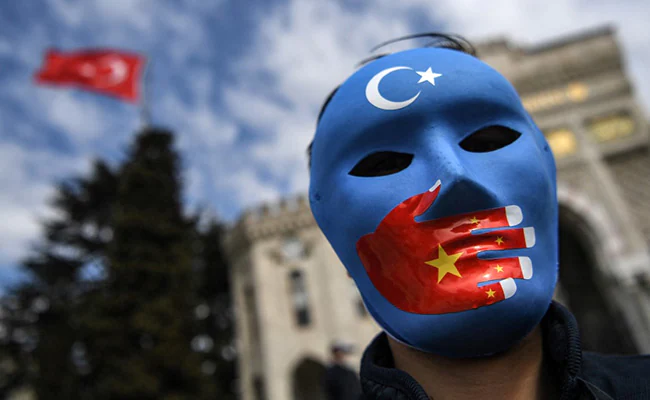For the last eight years, Uyghur Muslims in China’s Xinjiang province have experienced persecution and restrictions during the holy month of Ramzan. The Chinese government’s policies have systematically targeted religious practices, leading to a severe restriction of fundamental rights for this minority community.
In Xinjiang, China has prohibited teachers, students, and civil personnel from fasting during Ramzan since 2015. Children are also subject to these limitations; the Education Bureau rules forbid fasting and other religious observances in schools. Following inter-ethnic violence in 2009, the government stepped up its crackdown, which resulted in an increase in military presence and security measures throughout Xinjiang province.
China’s crackdown on Uyghurs
Restrictions on fasting and religious customs have been reported as part of China’s controversial Ramzan crackdown on Uyghurs. In Xinjiang, the Chinese government has ordered restaurants to stay open throughout Ramzan and prohibited teachers, students, and government servants from fasting. Uyghur rights organisation UHRP (The Uyghur Human Rights Project) has denounced this prohibition, claiming that it is an attempt to force Uyghurs to abandon their Muslim culture during the holy month.
In addition, there have been reports of heightened monitoring, limitations on religious practices, and initiatives to stop Uyghur Muslims in Xinjiang from fasting, all of which have contributed to unrest and violence in the area. The Chinese government’s larger campaign to repress and regulate Uyghur religious and cultural traditions includes the crackdown during Ramzan.
Surveillance and spying
The foundation of China’s repressive system is an advanced network of surveillance. China has implemented extensive tracking and surveillance initiatives for Uyghurs through partnerships with private companies. Mandatory DNA samples for genetic surveillance and biometric data collection, including iris and facial scans, are part of these programs.
Furthermore, China has strategically employed espionage to ensure that its minority Uyghur Muslim community does not fast during the holy month of Ramzan. In an article published by Radio Free Asia, it was reported that Chinese police are collaborating with spies known as “ears” to ensure that the ethnic group’s restriction on Ramzan fasting is upheld.
The extensive use of spies, referred to as ‘ears,’ to monitor Uyghur Muslims and ensure compliance with the fasting ban. These spies are drawn from ordinary citizens, police, and neighborhood committees, creating a pervasive atmosphere of surveillance. The government’s surveillance tactics include home searches, street patrols, and mosque inspections to enforce the prohibition on fasting.
According to the UN report, the main forces behind this monitoring have allegedly been “a broad network of people’s personal communication devices and financial histories, coupled with analytical use of big data technologies; an extensive network of “convenience police stations” and other checkpoints; and a pervasive network of surveillance cameras, including facial recognition capabilities.”
Impact on the Uyghur Community
The restrictions on Ramzan fasting have profoundly affected the Uyghur community’s religious and cultural practices. Several Uyghurs have been forcibly jailed in “transformation-through-education centers,” where they are subjected to cruel treatment and “brainwashing.” Ethnic tensions in the area are heightened by the crackdown on fasting, which is a component of larger attempts to undermine Uyghur culture, language, and religion.
Meanwhile, human rights organisations have expressed concerns about mass monitoring and breaches of religious freedom about China’s efforts in Xinjiang, and the international community has denounced these acts. The Chinese government continues to justify its policies under the pretext of battling “religious extremism” and upholding societal stability, in defiance of requests for accountability and openness.
Flagging concern over the plight of Uyghurs, a renowned author named Khaled Beydoun highlighted the sufferings of the minority community in his book “The New Crusades” and wrote, “Right now, in real time, while we fast, one to two million Uyghur Muslims are languishing inside of China’s dystopian system of concentration camps. Right now, while we fast, Uyghur Muslims are legally denied the right to observe the rites of Ramzan.”
He further mentioned, “Right now, as we wait to break our fast, Uyghur Muslims are force-fed pork and alcohol. This crude practice stands at the center of China’s design to eliminate the Uyghur people, slowly and systematically, and decimate Islam—a religion they call a ‘mental illness’ (sic).”
Future outlook
Religious freedom and cultural legacy are in jeopardy as Uyghur Muslims in Xinjiang endure another Ramzan under harsh circumstances. The continued persecution of Ramzan fasting is a reflection of a larger trend of discrimination based on religion and ethnicity that jeopardises the core identity of Uyghurs in China.
History of the Uyghur population
Chinese authorities and Uyghur nationalists disagree about the history of the Uyghur people in Xinjiang. While the official Chinese perspective claims that the Uyghurs in Xinjiang formed after the Uyghur Khaganate collapsed in ninth-century Mongolia, from the fusion of different indigenous peoples of the Tarim Basin and the westward-migrating Old Uyghurs, Uyghur historians see Uyghurs as the original inhabitants of Xinjiang, with a long history.
Some Uyghur nationalists claim they are descended from the Tocharians, while contemporary Western experts do not believe that present Uyghurs are directly sprung from the former Uyghur Khaganate of Mongolia.

